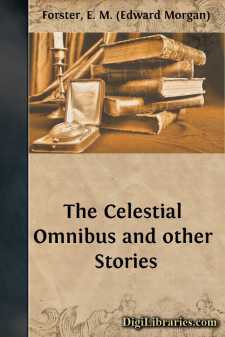Categories
- Antiques & Collectibles 13
- Architecture 36
- Art 48
- Bibles 22
- Biography & Autobiography 813
- Body, Mind & Spirit 142
- Business & Economics 28
- Children's Books 14
- Children's Fiction 11
- Computers 4
- Cooking 94
- Crafts & Hobbies 4
- Drama 346
- Education 46
- Family & Relationships 57
- Fiction 11828
- Games 19
- Gardening 17
- Health & Fitness 34
- History 1377
- House & Home 1
- Humor 147
- Juvenile Fiction 1873
- Juvenile Nonfiction 202
- Language Arts & Disciplines 88
- Law 16
- Literary Collections 686
- Literary Criticism 179
- Mathematics 13
- Medical 41
- Music 40
- Nature 179
- Non-Classifiable 1768
- Performing Arts 7
- Periodicals 1453
- Philosophy 64
- Photography 2
- Poetry 896
- Political Science 203
- Psychology 42
- Reference 154
- Religion 513
- Science 126
- Self-Help 84
- Social Science 81
- Sports & Recreation 34
- Study Aids 3
- Technology & Engineering 59
- Transportation 23
- Travel 463
- True Crime 29
The Celestial Omnibus and other Stories
Description:
Excerpt
Eustace's career—if career it can be called—certainly dates from that afternoon in the chestnut woods above Ravello. I confess at once that I am a plain, simple man, with no pretensions to literary style. Still, I do flatter myself that I can tell a story without exaggerating, and I have therefore decided to give an unbiassed account of the extraordinary events of eight years ago.
Ravello is a delightful place with a delightful little hotel in which we met some charming people. There were the two Miss Robinsons, who had been there for six weeks with Eustace, their nephew, then a boy of about fourteen. Mr. Sandbach had also been there some time. He had held a curacy in the north of England, which he had been compelled to resign on account of ill-health, and while he was recruiting at Ravello he had taken in hand Eustace's education—which was then sadly deficient—and was endeavouring to fit him for one of our great public schools. Then there was Mr. Leyland, a would-be artist, and, finally, there was the nice landlady, Signora Scafetti, and the nice English-speaking waiter, Emmanuele—though at the time of which I am speaking Emmanuele was away, visiting a sick father.
To this little circle, I, my wife, and my two daughters made, I venture to think, a not unwelcome addition. But though I liked most of the company well enough, there were two of them to whom I did not take at all. They were the artist, Leyland, and the Miss Robinsons' nephew, Eustace.
Leyland was simply conceited and odious, and, as those qualities will be amply illustrated in my narrative, I need not enlarge upon them here. But Eustace was something besides: he was indescribably repellent.
I am fond of boys as a rule, and was quite disposed to be friendly. I and my daughters offered to take him out—'No, walking was such a fag.' Then I asked him to come and bathe—' No, he could not swim.'
"Every English boy should be able to swim," I said, "I will teach you myself."
"There, Eustace dear," said Miss Robinson; "here is a chance for you."
But he said he was afraid of the water!—a boy afraid!—and of course I said no more.
I would not have minded so much if he had been a really studious boy, but he neither played hard nor worked hard. His favourite occupations were lounging on the terrace in an easy chair and loafing along the high road, with his feet shuffling up the dust and his shoulders stooping forward. Naturally enough, his features were pale, his chest contracted, and his muscles undeveloped. His aunts thought him delicate; what he really needed was discipline.
That memorable day we all arranged to go for a picnic up in the chestnut woods—all, that is, except Janet, who stopped behind to finish her water-colour of the Cathedral—not a very successful attempt, I am afraid.
I wander off into these irrelevant details, because in my mind I cannot separate them from an account of the day; and it is the same with the conversation during the picnic: all is imprinted on my brain together. After a couple of hours' ascent, we left the donkeys that had carried the Miss Robinsons and my wife, and all proceeded on foot to the head of the valley—Vallone Fontana Caroso is its proper name, I find.
I have visited a good deal of fine scenery before and since, but have found little that has pleased me more. The valley ended in a vast hollow, shaped like a cup, into which radiated ravines from the precipitous hills around....






